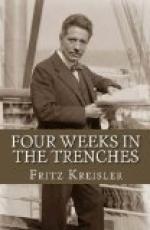I, too, soon got accustomed to the deadly missiles,—in fact, I had already started to make observations of their peculiarities. My ear, accustomed to differentiate sounds of all kinds, had some time ago, while we still advanced, noted a remarkable discrepancy in the peculiar whine produced by the different shells in their rapid flight through the air as they passed over our heads, some sounding shrill, with a rising tendency, and the others rather dull, with a falling cadence. A short observation revealed the fact that the passing of a dull-sounding shell was invariably preceded by a flash from one of our own cannon in the rear on the hill, which conclusively proved it to be an Austrian shell. It must be understood that as we were advancing between the positions of the Austrian and Russian artillery, both kinds of shells were passing over our heads. As we advanced the difference between shrill and dull shell grew less and less perceptible, until I could hardly tell them apart. Upon nearing the hill the difference increased again more and more until on the hill itself it was very marked. After our trench was finished I crawled to the top of the hill until I could make out the flash of the Russian guns on the opposite heights and by timing flash and actual passing of the shell, found to my astonishment that now the Russian missiles had become dull, while on the other hand, the shrill shell was invariably heralded by a flash from one of our guns, now far in the rear. What had happened was this: Every shell describes in its course a parabolic line, with the first half of the curve ascending and the second one descending. Apparently in the first half of its curve, that is, its course while ascending, the shell produced a dull whine accompanied by a falling cadence, which changes to a rising shrill as soon as the acme has been reached and the curve points downward again. The acme for both kinds of shells naturally was exactly the half distance between the Russian and Austrian artillery and this was the point where I had noticed that the difference was the least marked. A few days later, in talking over my observation with an artillery officer, I was told the fact was known that the shells sounded different going up than when coming down, but this knowledge was not used for practical purposes. When I told him that I could actually determine by the sound the exact place where a shell coming from the opposing batteries was reaching its acme, he thought that this would be of great value in a case where the position of the opposing battery was hidden and thus could be located. He apparently spoke to his commander about me, for a few days later I was sent on a reconnoitering tour, with the object of marking on the map the exact spot where I thought the hostile shells were reaching their acme, and it was later on reported to me that I had succeeded in giving to our batteries the almost exact range of the Russian guns. I have gone into this matter at some length, because it is the only instance where my musical ear was of value during my service.




